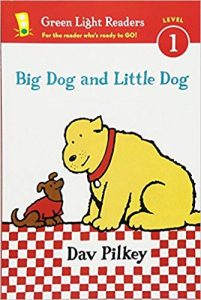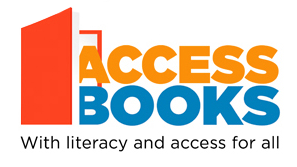I’m a big fan of children’s book illustrator/author, Dav Pikley. So, when I came across a beginning reader by him called, “Big Dog and Little Dog,” I bought it for my three year-old grandson. The grandkids should love it.
 The book is complex with a great deal of subtext.
The book is complex with a great deal of subtext.
Big Dog and Little Dog want food.
Here is some food for Big Dog.
Big Dog is happy.
Here is some food for Little Dog.
Little Dog is happy too.
Deep, I know!
After the dozen or so pages of the story, the book includes f#$cking comprehension questions. The publisher, Houghton Mifflin Harcourt, calls them “Bonus Skill Building Activities.” I am not going to destroy my grandson’s love of reading by giving him books with a stupid quiz at the back.
Want to know why Johnny can’t read?
Textbook publishers and the educators engaged in a faith-based relationship with them!
I am sure that if you asked the publisher why they felt compelled to ruin a book with assessment schlock, I bet they would say, “teachers want it.” Well, who cares? Any teacher incapable of engaging a child in a conversation about Big Dog and Little Dog should be servicing robot drink dispensers at McDonalds. Better yet, perhaps teachers should shut up altogether and just let kids enjoy reading a book for information or pleasure.
Accelerated Reader, comprehension questions every three paragraphs, and other cynical schemes designed to interrupt reading for the purpose of ranking, sorting, or failing children have a prophylactic impact on reading far more destructive than playing Minecraft or binge-watching episodes of Wife Swap.
When I was a kid, once you could read, there was no longer a subject in your schedule called, “Reading.” Today, some kids receive reading instruction K-12. These are the very same kids who we are often made to believe are not good at reading. Perhaps adults need to stop ruining the reading experience and provide kids of all ages with access to high-interest reading material free of moronic “bonus skill building activities.”
If you wish to do something about childhood literacy, donate generously to my favorite charity, Access Books. They build and stock beautiful libraries in third world schools where children would not otherwise have access to books. Criminally, those schools are in California!
Veteran educator Dr. Gary Stager is co-author of Invent To Learn — Making, Tinkering, and Engineering in the Classroom and the founder of the Constructing Modern Knowledge summer institute. He led professional development in the world’s first 1:1 laptop schools and designed one of the oldest online graduate school programs. Learn more about Gary here.
Veteran educator Gary Stager, Ph.D. is the author of Twenty Things to Do with a Computer – Forward 50, co-author of Invent To Learn — Making, Tinkering, and Engineering in the Classroom, publisher at Constructing Modern Knowledge Press, and the founder of the Constructing Modern Knowledge summer institute. He led professional development in the world’s first 1:1 laptop schools thirty years ago and designed one of the oldest online graduate school programs. Gary is also the curator of The Seymour Papert archives at DailyPapert.com. Learn more about Gary here.


I’m with you – I cannot stand accelerated reader. I don’t understand, with the research I’ve seen, why schools continue to use it. To play devil’s advocate, however, I’ll share that I remember some parents of very young children who WANTED questions to ask their children while they were reading to them. Some parents admit that they don’t know how to engage with their children when reading aloud at home. They hadn’t been read to as a child. Maybe those questions can help guide parents?? Just an idea – I’m not in love with it, either. Maybe the book should come with “How to talk to your child while you’re reading with them” section at the beginning of it, instead of comprehension questions at the end.
How dare you denigrate “Wide Swap.” I know the prurient title turns people off, but it was actually a really interesting show about parenting and how an “outside” parent with a different background could help a family function better. One of my favorite episodes featured a boy who hated all the sports he felt obligated to play; it turned out he wanted to dance. The “swap” mom managed to broach the subject with the dad, who eventually understood what his son was really like, and rallied the family behind the son. It was an example of what television could do despite its sensationalist concept.